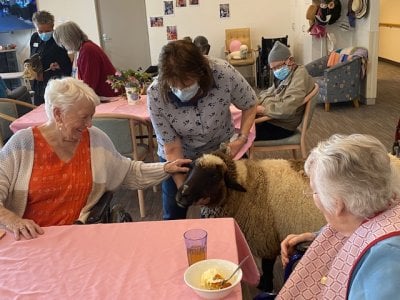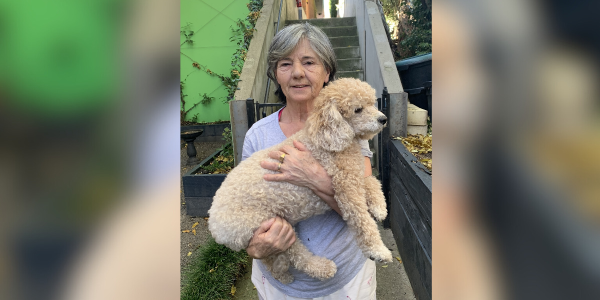Are seniors choosing their pets over their health? Advocates reveal the truth about aged care facilities' pet policies
Rolf Gericke is 78 years old and has been living on his own with his four cats in Tasmania since his wife died a few years ago.
Rolf has a deep and heartfelt bond with his feline companions and said he’d 'rather die than move into an aged care home without them'.
Rolf isn’t alone. It’s estimated that only one in five aged care homes in Australia will consider allowing pets, forcing seniors to risk their safety–or choose between their health and their beloved furry companions.
Companion Animal Network Australia (CANA) Chief Executive Trish Ennis said 86 per cent of people with pets in aged care settings experience improved mental and physical health.
However, pets can be denied due to regulatory issues or concerns about hygiene, lack of staff to care for animals, or the risk of tripping over a lead or pet bedding.
But what about those seniors who rely on the companionship and unconditional love provided by their furry, feathered or finned friends?
Trish has heard stories of seniors who have no intention of giving up their beloved pet–instead, choosing to stay at home and risking their health rather than leaving the home and being separated from their animal.
‘If you can imagine moving into residential care anyway, you're giving up your house, you're giving up everything to fit in one room,’ she said.
‘It's a very depressing, hard time to go through, but to give up your best friend and companion along with that, and god knows where that pet's going to go.’
Glen Hardwick, Chief Executive of Christian Homes Tasmania, acknowledges that having pets in aged care homes comes with challenges.
'As much as we'd love to enable our residents in the residential care to bring their pets in, the risks to them, our staff and other residents are too high,’ he said.
Instead, Hardwick notes that they now bring in a sheep, which does a lap of the facility and provides joy and interaction for the residents. However, the sheep only leave little messes behind.
‘The interaction with the residents is very clearly to their benefit both emotionally and physically,’ Mr Hardwick added.
Meanwhile, in Victoria, a group of aged care homes not only allows pets but encourages people to bring them in.
Samatha Jewell, the Chief Executive of Lifeview, said that she has noticed a significant difference since implementing the new pet policy.
'They settle in quicker…remain more independent because you're still caring for that pet, so you do get up to feed it or walk the dog,' Jewell mentioned.
She also shared: 'It's better for their mental health and wellbeing, and it also benefits the other residents because they get to enjoy that pet as well'.
There are certain rules to having a pet in Lifeview, however. The owner must have leads outside the bedroom and have a family or a representative who will take the pet in an emergency.
Ms Jewell has worked closely with Trish Ennis of CANA to safely incorporate pets into aged care homes and educate their providers on their policies and procedures.
‘A major problem a lot of the residential care places have is a lack of education,’ Ms Ennis claimed.
In Rolf Gericke’s case, however, his cats are not allowed in an aged care home. He has some health issues and receives a check-in call from the Red Cross every morning. He hopes that more facilities will consider pets.
‘It would make it easier, I believe, for a lot of people that have no other option than ending up in a nursing home,’ he said.

What do you think of this story, members? Do you think pets should be allowed in aged care homes? Let us know in the comments below.
Rolf has a deep and heartfelt bond with his feline companions and said he’d 'rather die than move into an aged care home without them'.
Rolf isn’t alone. It’s estimated that only one in five aged care homes in Australia will consider allowing pets, forcing seniors to risk their safety–or choose between their health and their beloved furry companions.
Companion Animal Network Australia (CANA) Chief Executive Trish Ennis said 86 per cent of people with pets in aged care settings experience improved mental and physical health.
However, pets can be denied due to regulatory issues or concerns about hygiene, lack of staff to care for animals, or the risk of tripping over a lead or pet bedding.
But what about those seniors who rely on the companionship and unconditional love provided by their furry, feathered or finned friends?
Trish has heard stories of seniors who have no intention of giving up their beloved pet–instead, choosing to stay at home and risking their health rather than leaving the home and being separated from their animal.
‘If you can imagine moving into residential care anyway, you're giving up your house, you're giving up everything to fit in one room,’ she said.
‘It's a very depressing, hard time to go through, but to give up your best friend and companion along with that, and god knows where that pet's going to go.’
Glen Hardwick, Chief Executive of Christian Homes Tasmania, acknowledges that having pets in aged care homes comes with challenges.
'As much as we'd love to enable our residents in the residential care to bring their pets in, the risks to them, our staff and other residents are too high,’ he said.
Instead, Hardwick notes that they now bring in a sheep, which does a lap of the facility and provides joy and interaction for the residents. However, the sheep only leave little messes behind.
‘The interaction with the residents is very clearly to their benefit both emotionally and physically,’ Mr Hardwick added.
Meanwhile, in Victoria, a group of aged care homes not only allows pets but encourages people to bring them in.
Samatha Jewell, the Chief Executive of Lifeview, said that she has noticed a significant difference since implementing the new pet policy.
'They settle in quicker…remain more independent because you're still caring for that pet, so you do get up to feed it or walk the dog,' Jewell mentioned.
She also shared: 'It's better for their mental health and wellbeing, and it also benefits the other residents because they get to enjoy that pet as well'.
There are certain rules to having a pet in Lifeview, however. The owner must have leads outside the bedroom and have a family or a representative who will take the pet in an emergency.
Ms Jewell has worked closely with Trish Ennis of CANA to safely incorporate pets into aged care homes and educate their providers on their policies and procedures.
‘A major problem a lot of the residential care places have is a lack of education,’ Ms Ennis claimed.
In Rolf Gericke’s case, however, his cats are not allowed in an aged care home. He has some health issues and receives a check-in call from the Red Cross every morning. He hopes that more facilities will consider pets.
‘It would make it easier, I believe, for a lot of people that have no other option than ending up in a nursing home,’ he said.
Key Takeaways
- Many elderly people allegedly risk their health to stay with their pets, as most aged care facilities do not allow animals.
- The Companion Animal Network Australia (CANA) statistics show that only one in five aged care homes in Australia will consider allowing pets, despite evidence that pets improve mental and physical health for aged care residents.
- Due to hygiene and safety concerns, many facilities are reluctant to allow pets, although some facilities do enable pet therapy programs where animals visit and interact with the residents.
- In contrast, a group of aged care homes in Victoria encourages residents to bring their pets, as they have seen beneficial impacts on the residents' wellbeing.
What do you think of this story, members? Do you think pets should be allowed in aged care homes? Let us know in the comments below.










